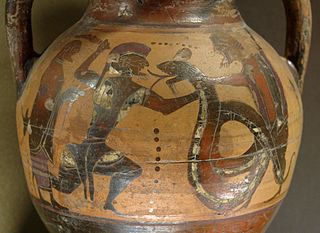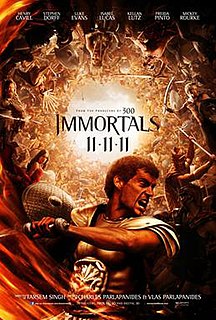Related Research Articles

Apollo is one of the most important and complex of the Olympian deities in classical Greek and Roman religion and Greek and Roman mythology. The national divinity of the Greeks, Apollo has been recognized as a god of archery, music and dance, truth and prophecy, healing and diseases, the Sun and light, poetry, and more. He is the son of Zeus and Leto, and the twin brother of Artemis, goddess of the hunt. Seen as the most beautiful god and the ideal of the kouros, Apollo is considered to be the most Greek of all gods. Apollo is known in Greek-influenced Etruscan mythology as Apulu.

In Greek mythology, Aegeus was an archaic figure in the founding myth of Athens. The "goat-man" who gave his name to the Aegean Sea was, next to Poseidon, the father of Theseus, the founder of Athenian institutions and one of the kings of Athens.

Theseus was the mythical king and founder-hero of Athens. Like Perseus, Cadmus, or Heracles, Theseus battled and overcame foes that were identified with an archaic religious and social order. His role in history has been called "a major cultural transition, like the making of the new Olympia by Hercules".
Propitiation, also called by some expiation, is the act of appeasing or making well-disposed a deity, thus incurring divine favor or avoiding divine retribution.

In ancient Greek mythology, Amphitrite was a sea goddess and wife of Poseidon and the queen of the sea. She was a daughter of Doris and Nereus. Under the influence of the Olympian pantheon, she became the consort of Poseidon and was later used as a symbolic representation of the sea and the goddess of calm seas and safe passage through storms. It is said her voice is the only thing that can calm her husband’s mightiest of rages and lull him to a deep slumber so the ocean could be back at peace. In Roman mythology, the consort of Neptune, a comparatively minor figure, was Salacia, the goddess of saltwater.

Asclepius or Hepius is a hero and god of medicine in ancient Greek religion and mythology. He is the son of Apollo and Coronis, or Arsinoe, or Apollo alone. Asclepius represents the healing aspect of the medical arts; his daughters are Hygieia, Iaso, Aceso, Aegle, and Panacea. He was associated with the Roman/Etruscan god Vediovis and the Egyptian Imhotep. He was one of Apollo's sons, sharing with Apollo the epithet Paean. The rod of Asclepius, a snake-entwined staff, remains a symbol of medicine today. Those physicians and attendants who served this god were known as the Therapeutae of Asclepius.

In Greek mythology, the Cretan Bull was the bull Pasiphaë fell in love with, giving birth to the Minotaur.

Delphinium is a genus of about 300 species of perennial flowering plants in the family Ranunculaceae, native throughout the Northern Hemisphere and also on the high mountains of tropical Africa. The genus was erected by Carl Linnaeus.
Pyanopsia (Πυανόψια) or Pyanepsia (Πυανέψια) was an ancient Greek festival in honor of Apollo, held at Athens on the 7th of the month Pyanepsion (October/November). Its name literally means "bean-stewing", in reference to the sacred offerings given during this time, and is derived from the Greek words πύανος - pyanos "bean" and ἕψειν - hepsein "to boil".
Thargelia was one of the chief Athenian festivals in honour of the Delian Apollo and Artemis, held on their birthdays, the 6th and 7th of the month Thargelion.

Daphnephoria was a festival held every ninth year at Thebes in Boeotia in honour of Apollo Ismenius or Galaxius.
In ancient Roman religion, Averruncus or Auruncus is a god of averting harm. Aulus Gellius says that he is one of the potentially malignant deities who must be propitiated for their power to both inflict and withhold disaster from people and the harvests.
Carneia was the name of one of the great national festivals of Sparta, held in honor of Apollo Carneus. Whether Carneus was originally an old Peloponnesian divinity subsequently identified with Apollo, or merely an "emanation" from him, is uncertain; but there seems no reason to doubt that Carneus means "the god of flocks and herds", in a wider sense, of the harvest and the vintage. The chief centre of his worship was Sparta, where the Carneia took place every year from the 7th to the 15th of the month Carneus. During this period all military operations were suspended.
The Delia were festivals and games celebrated in classical antiquity at the great celebratory gathering (panegyris) on the island of Delos.
The Boedromia (Βοηδρόμια) was an ancient Greek festival held at Athens on the 7th of Boedromion (summer) in the honor of Apollo Boedromios. Though Apollo was referred to as Boedromios by the Boeotians as well as other Greeks, the festival was exclusively celebrated by the Athenians. According to Demosthenes, the only classical writer to refer to the festival, it had a military connotation, and thanks the god for his assistance to the Athenians during wars. It could also commemorate a specific intervention at the origin of the festival. Various ancient sources have offered differing accounts on what this intervention may have been. According to Plutarch, Theseus refused to battle against the Amazons until he had sacrificed to Phobos. It is in recognition of the help granted in the ensuing battle that the Athenians celebrate the festival. However, the Suda and Euripides report that the festival's origins lie in the help either Xuthos or his son Ion granted to the Athenians when they were attacked by Eumolpos during the reign of Erechtheus. During the event, sacrifices were also made to Artemis Agrotera.

Immortals is a 2011 American epic fantasy action film directed by Tarsem Singh and starring Henry Cavill, Freida Pinto, and Mickey Rourke. The film also stars Luke Evans, Steve Byers, Kellan Lutz, Joseph Morgan, Stephen Dorff, Daniel Sharman, Alan van Sprang, Isabel Lucas, Corey Sevier, and John Hurt. The film was previously named Dawn of War and War of the Gods before being officially named Immortals, and is loosely based on the Greek myths of Theseus, the Minotaur and the Titanomachy.

The Athenian Treasury at Delphi was constructed by the Athenians to house dedications and votive offerings made by their city and citizens to the sanctuary of Apollo. The entire treasury including its sculptural decoration is built of Parian marble. The date of construction is disputed, and scholarly opinions range from 510 to 480 BCE. It is located directly below the Temple of Apollo along the Sacred Way for all visitors to view the Athenian treasury on the way up to the sanctuary.
The festival calendar of Classical Athens involved the staging of many festivals each year.
The apellaia (ἀπελλαῖα) were the offerings made at the initiation of a young man (kouros) at a meeting of a family-group of the northwest Greeks. Apellaios (Ἀπελλαῖος) is the month of these rites and oferrings, and Apellon, is the megistos kouros .
Psamathe, sometimes given only as the daughter of Crotopus, was daughter of King Crotopus of Argos, who became the lover of the god Apollo. Fearing her father, she exposed the child (Linus) which was killed by shepherd dogs, and she herself was condemned to death by her father, according to some tellings.
References
- 1 2

- A. Mommsen, Festeder Stadt Athen (1898)
- L. Preller, Griechische Mythologie (4th ed., 1887)
- P. Stengel, Die griechische Kultusaltertümer (1898)
- Daremberg and Saglio, Dictionnaire des antiquités
- G. F. Schömann, Griechische Altertümer (4th ed., 1897–1902).
| This article about a religious festival is a stub. You can help Wikipedia by expanding it. |
| This Ancient Greece related article is a stub. You can help Wikipedia by expanding it. |